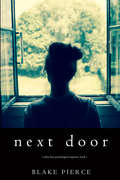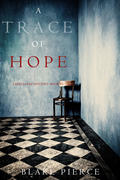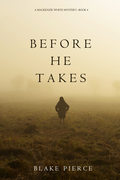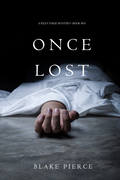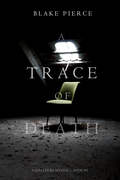
Блейк Пирс
Once Pined
Just when they were in line at the cash register, a strange man walked toward them. He wore something on his face that flattened his nose and lips and cheeks and made him look funny and scary at the same time, sort of like a circus clown. It took little Riley a moment to realize that he was wearing a nylon stocking over his head, just like Mommy wore on her legs.
He was holding a gun. The gun looked huge. He was pointing it at Mommy.
“Give me your purse,” he said.
But Mommy didn’t do it. Riley didn’t know why. All she knew was that Mommy was scared, maybe too scared to do what the man told her to do, and probably Riley should be scared too, and so she was.
He said some bad words to Mommy, but she still didn’t give him her purse. She was shaking all over.
Then came a bang and a flash, and Mommy fell to the floor. The man said more bad words and ran away. Mommy’s chest was bleeding, and she gasped and twisted for a moment before she fell completely still.
Little Riley started screaming. She didn’t stop screaming for a long time.
The gentle touch of Bill’s hand on hers brought Riley back to the present.
“I’m sorry,” Bill said. “I didn’t mean to bring it all back.”
He’d obviously seen the tear trickling down her cheek. She squeezed his hand. She was grateful for his understanding and concern. But the truth was, Riley had never told Bill about a memory that troubled her even more.
Her father had been a colonel in the Marines – a stern, cruel, unfeeling, unloving, and unforgiving man. During all the years that followed, he’d blamed Riley for her mother’s death. It didn’t matter that she’d only been six years old.
“You might as well have shot her yourself, for all the good you did her,” he’d said.
He’d died last year without ever forgiving her.
Riley wiped her cheek and looked out the window at the slowly crawling landscape miles below.
As she so often did, she realized how much she and Bill had in common, and how haunted they both were by past tragedy and injustice. During all the years that they’d been partners, they’d both been driven by similar demons, haunted by similar ghosts.
For all her worry about Jilly and life at home, Riley now knew that she’d been right to agree to join Bill on this case. Every time they worked together, their bond grew stronger and deeper. This time was going to be no exception.
They’d solve these murders, Riley was sure of it. But what would she and Bill gain or lose by it?
Maybe we’ll both heal a little, Riley thought. Or maybe our wounds will open and hurt more.
She told herself it didn’t really matter. They always worked together to get the job done, no matter how tough it was.
Now they could be facing a particularly ugly crime.
CHAPTER SEVEN
When the BAU plane landed at Sea-Tac, the Seattle-Tacoma International Airport, a heavy rain was streaking across the windows. Riley looked at her watch. It was about two in the afternoon at home now, but it was eleven in the morning here. That would give them time to get something done on this case today.
As she and Bill moved toward the exit, the pilot came out of his cabin and handed each of them an umbrella.
“You’ll need these,” he said with a grin. “Winter is the worse time to be in this corner of the country.”
When they stood at the top of the stairs, Riley had to agree. She was glad they had umbrellas, but she wished she had dressed warmer. It was cold as well as rainy.
An SUV pulled up at the edge of the tarmac. Two men in raincoats hurried out of the vehicle toward their plane. They introduced themselves as Agents Havens and Trafford of the FBI field office in Seattle.
“We’re taking you to the medical examiner’s office,” Agent Havens said. “The team leader on this investigation is waiting for you there.”
Bill and Riley got into the car, and Agent Trafford started to drive through the drenching rain. Riley could make barely out the usual airport hotels along the way, and that was all. She knew there was a vital city out there, but it was practically invisible.
She wondered if she was ever going to see Seattle while she was here.
*
The minute Riley and Bill sat down in the conference room in Seattle’s medical examiner’s building, she sensed that trouble was brewing. She exchanged glances with Bill, and she could tell that he was feeling the tension too.
Team Leader Maynard Sanderson was a big-chested, big-jawed man with a presence that struck Riley as falling somewhere between a military officer and an evangelical preacher.
Sanderson was glowering at a portly man whose thick walrus mustache gave his face what seemed to be a permanent scowl. He had been introduced as Perry McCade, Seattle’s Chief of Police.
The body language of the two men and the places they had taken at the table spoke volumes to Riley. For whatever reason, the last thing they wanted was to be in the same room together. And she also felt sure that both men especially hated having Riley and Bill here.
She remembered what Brent Meredith had said before they left Quantico.
“Don’t expect a cozy welcome. Neither the cops nor the Feds will be happy to see you.”
Riley wondered what kind of minefield she and Bill had walked into.
A complex power struggle was going on, without a word being spoken. And in just a few minutes, she knew it was going to start getting verbal.
By contrast, Chief Medical Examiner Prisha Shankar looked comfortable and unconcerned. The dark-skinned, black-haired woman was about Riley’s age and appeared to be stoic and imperturbable.
She’s on her own turf, after all, Riley figured.
Agent Sanderson took the liberty of getting the meeting underway.
“Agents Paige and Jeffreys,” he said to Riley and Bill, “I’m pleased that you could make it all the way from Quantico.”
His icy voice told Riley that the opposite was true.
“Glad to be of service,” Bill said, not sounding very sure of himself.
Riley just smiled and nodded.
“Gentlemen,” Sanderson said, ignoring the presence of two women, “we’re all here to investigate two murders. A serial killer might be getting started here in the Seattle area. It’s up to us to stop him before he kills again.”
Police Chief McCade growled audibly.
“Would you like to comment, McCade?” Sanderson asked dryly.
“It’s not a serial,” McCade grumbled. “And it’s not an FBI case. My cops have got this under control.”
Riley was starting to get the picture. She remembered how Meredith had said that the local authorities were floundering with this case. And now she could see why. Nobody was on the same page, and nobody agreed on anything.
Police Chief McCade was angry that the FBI was muscling in on a local murder case. And Sanderson was fuming that the FBI had sent Bill and Riley from Quantico to straighten everybody out.
The perfect storm, Riley thought.
Sanderson turned toward the chief medical examiner and said, “Dr. Shankar, perhaps you’d like to summarize what we currently know.”
Seemingly aloof from the underlying tensions, Dr. Shankar clicked a remote to bring up an image on the wall screen. It was a driver’s license photo of a rather plain-looking woman with straight hair of a dullish brown color.
Shankar said, “A month and a half ago, a woman named Margaret Jewell died at home in her sleep of what appeared to be a heart attack. She’d been complaining the day before of joint pains, but according to her spouse, that wasn’t unusual. She suffered from fibromyalgia.”
Shankar clicked the remote again and brought up another driver’s license photo. It showed a middle-aged man with a kindly but melancholy face.
She said, “A couple of days ago, Cody Woods admitted himself to the South Hill Hospital, complaining of chest pains. He also complained of joint pain, but again that wasn’t surprising. He’d had some arthritis, and he’d had knee replacement surgery a week before. Within hours of being admitted to the hospital, he, too, died of what appeared to be a heart attack.”
“Totally unconnected deaths,” McCade muttered.
“So now are you saying that neither one of these deaths was murder?” Sanderson said.
“Margaret Jewell, probably,” McCade said. “Cody Woods, certainly not. We’re letting him be a distraction. We’re muddying the waters. If you’d just leave it to my boys and me, we’d solve this case in no time.”
“You’ve had a month and a half on the Jewell case,” Sanderson said.
Dr. Shankar smiled rather mysteriously as McCade and Sanderson continued to bicker. Then she clicked the remote again. Two more photos came up.
The room fell quiet, and Riley felt a jolt of surprise.
The men in both photos looked Middle Eastern. Riley didn’t recognize one of them. But she sure did recognize the other.
It was Saddam Hussein.
CHAPTER EIGHT
Riley stared at the image on the wall screen. Where could the chief medical examiner possibly be going with a photo of Saddam Hussein? The deposed leader of Iraq had been executed in 2006 for crimes against humanity. What was his connection with a possible serial killer in Seattle?
After letting the effect of the photos settle in, Dr. Shankar spoke again.
“I’m sure we all recognize the man on the left. The man on the right was Majidi Jehad, a Shia dissident against Saddam’s regime. In May 1980, Jehad was granted permission to travel to London. When he stopped at a Baghdad police station to pick up his passport, he was treated to a glass of orange juice. He left Iraq, apparently safe and sound. He died soon after he got to London.”
Dr. Shankar brought up pictures of many more Middle Eastern faces.
“All of these men met similar fates. Saddam liquidated hundreds of dissidents in much the same way. When some of them were released from prison, they were offered congratulatory drinks to toast their freedom. None of them lived very long.”
Chief McCade nodded with understanding.
“Thallium poisoning,” he said.
“That’s right,” Dr. Shankar said. “Thallium is a chemical element that can be turned into a colorless, odorless, and tasteless soluble powder. It was Saddam Hussein’s poison of choice. But he hardly invented the idea of assassinating his enemies with it. It is sometimes called the ‘poisoner’s poison’ because it acts slowly and produces symptoms that can result in mistaken causes of death.”
She clicked the remote, and a few more faces appeared, including that of Cuban dictator Fidel Castro.
She said, “In 1960, the French secret service used thallium to kill the Cameroon rebel leader Félix-Roland Moumié. And it is widely believed that the CIA tried to use thallium in one of its many failed attempts to assassinate Fidel Castro. The plan was to put thallium powder in Castro’s shoes. If the CIA had succeeded in that particular method, Castro’s death would have been humiliating as well as slow and painful. That iconic beard of his would have fallen out before he died.”
She clicked the remote, and the faces of Margaret Jewell and Cody Woods appeared again.
“I’m telling you all this so that you’ll understand that we’re dealing with a very sophisticated murderer,” Dr. Shankar said. “I found traces of thallium in the bodies of both Margaret Jewell and Cody Woods. There’s no doubt in my mind that they were both poisoned to death by the same killer.”
Dr. Shankar looked around at everybody in the room.
“Any comments so far?” she asked.
“Yeah,” Chief McCade said. “I still don’t think the deaths are connected.”
Riley was startled by the comment. But Dr. Shankar didn’t look surprised.
“Why not, Chief McCade?” she asked.
“Cody Woods was a plumber,” McCade said. “Wouldn’t it have been possible for him to have been exposed to thallium as an occupational hazard?”
“It’s possible,” Dr. Shankar said. “Plumbers have to be careful to avoid lots of hazardous substances, including asbestos and heavy metals such as arsenic and thallium. But I don’t think this was what happened in Cody Woods’ case.”
Riley was becoming more and more intrigued.
“Why not?” she asked.
Dr. Shankar clicked the remote, and toxicology reports appeared.
“These killings seem to be thallium poisoning with a difference,” she said. “Neither victim showed certain classic symptoms – hair loss, fever, vomiting, abdominal pain. As I said before, there was some joint pain, but little else. Death came quite suddenly, looking much like an ordinary heart attack. There was no lingering at all. If my staff hadn’t been on their toes, they might not have even noticed that these were cases of thallium poisoning.”
Bill seemed to be sharing Riley’s fascination.
“So we’re dealing with what – designer thallium?” he asked.
“Something like that,” Dr. Shankar said. “My staff is still untangling the chemical makeup of the cocktail. But one of the ingredients is definitely potassium ferrocyanide – a chemical that you might be familiar with as the dye Prussian blue. That’s strange, because Prussian blue happens to be the only known antidote to thallium poisoning.”
Chief McCade’s large mustache was twitching.
“That doesn’t make sense,” he growled. “Why would a poisoner administer an antidote along with the poison?”
Riley hazarded a guess.
“Might it have been to disguise the symptoms of thallium poisoning?”
Dr. Shankar nodded in agreement.
“That’s my working theory. The other chemicals we found would have interacted with thallium in a complex way that we don’t yet understand. But they probably helped control the nature of the symptoms. Whoever concocted the mixture knew what they were doing. They had a pretty keen knowledge of both pharmacology and chemistry.”
Chief McCade was drumming his fingers on the table.
“I don’t buy it,” he said. “Your results for the second victim must have been skewed by your results for the first. You found what you were looking for.”
For the first time, Dr. Shankar’s face showed a trace of surprise. Riley, too, was taken aback by the police chief’s audacity in questioning Shankar’s expertise.
“What makes you say that?” Dr. Shankar asked.
“Because we have a surefire suspect for Margaret Jewell’s killing,” he said. “She was married to another woman, name of Barbara Bradley – calls herself Barb. The couple’s friends and neighbors say the two were having problems, loud fights that woke up the neighbors. Bradley actually has a past record for criminal assault. Folks say she has a hair-trigger temper. She did it. We’re all but sure of it.”
“Why haven’t you brought her in?” Agent Sanderson demanded.
Chief McCade’s eyes darted about defensively.
“We’ve questioned her, at home,” he said. “But she’s a sly character, and we still haven’t got enough evidence to bring her in. We’re building a case. It’s taking some time.”
Agent Sanderson smirked and grunted.
He said, “Well, while you’ve been building your case, it seems that your ‘surefire’ suspect has gone right ahead and killed somebody else. You’d better pick up the pace. She might be getting ready to do it again right now.”
Chief McCade’s face was getting red with anger.
“You’re dead wrong,” he said. “I’m telling you, Margaret Jewell’s killing was an isolated incident. Barb Bradley didn’t have any motive to kill Cody Woods, or anybody else as far as we know.”
“As far as you know,” Sanderson added in a scoffing tone.
Riley could feel the underlying tensions coming to the surface. She hoped the meeting would end without a knockdown, drag-out fight.
Meanwhile, her brain was clicking away, trying to make sense of what little she knew so far.
She asked Chief McCade, “How financially well off were Jewell and Bradley?”
“Not well off at all,” he said. “Lower middle-class. In fact, we’re thinking that financial strain might have been part of the motive.”
“What does Barb Bradley do for a living?”
“She makes deliveries for a linen service,” McCade said.
Riley felt a hunch forming in her mind. She thought that a killer who used poison was likely to be a woman. And as a delivery person, this one could have had access to various health facilities. This was definitely someone she’d like to talk to.
“I’d like to have Barb Bradley’s home address,” she said. “Agent Jeffreys and I should go and interview her.”
Chief McCade looked at her as if she were out of her mind.
“I just told you, we’ve done that already,” he said.
Not well enough, apparently, Riley thought.
But she stifled the urge to say so aloud.
Bill put in, “I agree with Agent Paige. We should go check Barb Bradley out for ourselves.”
Chief McCade obviously felt insulted.
“I won’t allow it,” he said.
Riley knew that the FBI team leader, Agent Sanderson, could overrule McCade if he chose to. But when she looked to Sanderson for support, he was staring daggers at her.
Her heart sank. She instantly understood the situation. Although Sanderson and McCade hated each other, they were allies in their resentment of Riley and Bill. As far as both of them were concerned, agents from Quantico had no business being here on their turf. Whether they realized it or not, their egos were more important than the case itself.
How are Bill and I going to get anything done? she wondered.
By contrast, Dr. Shankar seemed as cool and collected as ever.
She said, “I’d like to know why it’s such a bad idea for Jeffreys and Paige to interview Barb Bradley.”
Riley was surprised at Dr. Shankar’s audacity in speaking up. After all, even as the chief medical examiner, she was brazenly overstepping her bounds.
“Because I’ve got my own investigation going!” McCade said, almost shouting now. “They’re liable to make a mess of it!”
Dr. Shankar smiled that inscrutable smile of hers.
“Chief McCade, are you actually questioning the competence of two agents from Quantico?”
Then, turning toward the FBI team leader, she added, “Agent Sanderson, what do you have to say about this?”
McCade and Sanderson both stared at Dr. Shankar in open-mouthed silence.
Riley noticed that Dr. Shankar was smiling at her. Riley couldn’t help smiling back at her in admiration. Here in her own building, Shankar knew how to project an authoritative presence. It didn’t matter who else thought they were in charge. She was one tough customer.
Chief McCade shook his head with resignation.
“OK,” he said. “If you want the address, you’ve got it.”
Agent Sanderson quickly added, “But I want some of my people to go with you.”
“That sounds fair,” Riley said.
McCade scribbled down the address and handed it to Bill.
Sanderson called the meeting to a close.
“Jesus, did you ever see such a pair of arrogant jerks in your life?” Bill asked as Riley walked with him to their car. “How the hell are we going to get anything done?”
Riley didn’t reply. The truth was, she didn’t know. She sensed that this case was going to be tough enough without having to deal with local power politics. She and Bill had to get their job done quickly before anyone else died.
CHAPTER NINE
Today her name was Judy Brubaker.
She enjoyed being Judy Brubaker.
People liked Judy Brubaker.
She was moving briskly around the empty bed, straightening sheets and plumping the pillows. As she did so, she smiled at the woman who was sitting in the comfortable armchair.
Judy hadn’t decided whether to kill her or not.
Time’s running out, Judy thought. I’ve got to make up my mind.
The woman’s name was Amanda Somers. Judy found her to be an odd, shy, and mousy little creature. She’d been under Judy’s care since yesterday.
Continuing to make up the bed, Judy began to sing.
Far from home,
So far from home —
This little baby’s far from home.
Amanda joined in with that small, reedy little voice of hers.
You pine away
From day to day
Too sad to laugh, too sad to play.
Judy was a bit surprised. Amanda Somers hadn’t shown any real interest in the lullaby until just now.
“You like that song?” Judy Brubaker asked.
“I suppose so,” Amanda said. “It’s sad, and I guess it fits my mood.”
“Why are you sad? Your treatment’s over and you’re going home. Most patients are happy to go home.”
Amanda sighed and said nothing. She put her hands together in a prayer position. Keeping her fingers together, she moved her palms away from each other. She repeated the movement a couple of times. It was an exercise Judy had taught her to help the healing process after Amanda’s carpal tunnel surgery.
“Am I doing this right?” Amanda asked.
“Almost,” Judy said, crouching beside her and touching her hands to correct her movements. “You need to keep the fingers elongated, so they bow outward. Remember, your hands are supposed to look like a spider doing pushups on a mirror.”
Amanda was doing it correctly now. She smiled, looking rather proud of herself.
“I can really feel it helping,” she said. “Thanks.”
Judy watched Amanda continue to do the exercise. Judy really hated the short, ugly scar that extended along the lower part of Amanda’s right hand.
Unnecessary surgery, Judy thought.
The doctors had taken advantage of Amanda’s trust and credulity. She was sure that less drastic treatments would have worked as well or better. A splint maybe, or some corticosteroid injections. Judy had seen too many doctors insist on surgery, whether it was needed or not. It always made her angry.
But today, Judy wasn’t upset just with the doctors. She felt impatient with the patient as well. She wasn’t sure just why.
Hard to draw out, this one, Judy thought as she sat down on the edge of the bed.
During their whole time together, Amanda had let Judy do all the talking.
Judy Brubaker had plenty of interesting things to talk about, of course. Judy wasn’t much like the now-vanished Hallie Stillians, who’d had the homey personality of a doting aunt.
Judy Brubaker was at once plainer and more flamboyant, and she usually wore a jogging suit instead of more conventional clothes. She loved to tell stories about her adventures – hang gliding, skydiving, scuba diving, mountain climbing, and the like. She’d hitchhiked across Europe and much of Asia.
Of course, none of those adventures had really happened. But they made for wonderful stories.
Most people liked Judy Brubaker. People who might find Hallie a bit cloying and sugary enjoyed Judy’s more plainspoken personality.
Maybe Amanda just doesn’t take to Judy, she thought.
For whatever reason, Amanda had told her almost nothing about herself. She was in her forties, but she never said anything about her past. Judy still didn’t know what Amanda did for a living, or if she did anything at all. She didn’t know whether Amanda had ever been married – although the absence of a wedding band indicated that she wasn’t married now.
Judy was dismayed by how things were going. And time really was running out. Amanda could get up and leave at any moment. And here Judy was, still trying to decide whether to poison her or not.
Part of her indecision was simple prudence. Things had changed a lot during the last few days. Her last two killings were now in the papers. It seemed that some smart medical examiner had detected thallium in the corpses. It was a worrisome development.
She had a teabag ready with an altered recipe that used a little more arsenic and a little less thallium. But detection was still a danger. She had no idea whether the deaths of Margaret Jewell and Cody Woods had been traced back to their rehab stays or to their caregivers. This method of killing was becoming riskier.
But the real problem was that the whole thing just didn’t feel right.
She had no rapport with Amanda Somers.
She didn’t feel like she even knew her.
Offering to “toast” Amanda’s departure with a cup of tea would feel forced, even vulgar.
Anyway, the woman was still here, exercising her hands, showing no inclination to go away just yet.
“Don’t you want to go home?” Judy asked.
The woman sighed.
“Well, you know, I’ve got other physical problems. There’s my back, for instance. It’s getting worse as I get older. My doctor says I need an operation for it. But I don’t know. I keep thinking that maybe therapy is all I need to get better. And you’re such a good therapist.”
“Thank you,” Judy said. “But you know, I don’t work here full time. I’m a freelancer, and today’s my last day here for the time being. If you stay here any longer, it won’t be under my care.”
Judy was startled by Amanda’s wistful gaze. Amanda had seldom made eye contact like this with her before.
“You don’t know what it’s like,” Amanda said.
“What what’s like?” Judy asked.
Amanda shrugged a little, still looking into Judy’s eyes.
“Being surrounded by people you can’t fully trust. People who seem to care about you, and maybe they do, but then again, maybe they don’t. Maybe they just want something from you. Users. Takers. A lot of people in my life are like that. I don’t have any family, and I don’t know who my friends are. I don’t know who I can trust and who I can’t.”
With a slight smile, Amanda added, “Do you understand what I’m saying?”
Judy wasn’t sure. Amanda was still speaking in riddles.
Does she have a crush on me? Judy wondered.
It wasn’t impossible. Judy was aware that people often thought she was gay. That always amused her, because she’d never really given any thought to whether Judy was gay or not.
But maybe it wasn’t that.
Maybe Amanda was simply lonely, and she’d come to like and trust Judy without her even realizing it.
One thing seemed certain. Amanda was emotionally very insecure, probably neurotic, certainly depressive. She must be taking quite an array of prescription medicines. If Judy could get a look at them, she might be able to come up with a cocktail especially for Amanda. She’d done that before, and it had its advantages, especially at a time like now. It would be good to skip the thallium recipe this once.
“Where do you live?” Judy asked.
An odd look crossed Amanda’s face, as if she were trying to decide what to tell Judy.
“On a houseboat,” Amanda said.
“A houseboat? Really?”
Amanda nodded. Judy’s interest was piqued. But why did she have the feeling that Amanda wasn’t telling her the truth – or at least not the whole truth?
“Funny,” Judy said. “I’ve lived in Seattle off and on for years, and there are so many houseboats in the waterways in these parts, but I’ve never actually been on one. One of the few adventures I haven’t had.”
Amanda’s smile brightened and she didn’t say anything. That inscrutable smile was starting to make Judy nervous. Was Amanda going to invite her to visit her on her houseboat? Did she even really have a houseboat?
“Do you do at-home visits for your clients?” Amanda asked.
“I do sometimes, but …”
“But what?”
“Well, I’m not supposed to in situations like this. This rehab center would consider it poaching. I signed an agreement not to.”
Amanda’s smile turned a little bit mischievous.
“Well, what would be wrong with your paying me a simple social visit? Just stop by. See my place. We could chat. Spend some time together. See where things go. And then, if I decided to hire you … well, that would be different, wouldn’t it? Not poaching at all.”
Judy smiled. She was starting to appreciate Amanda’s cleverness. What she was suggesting would still be bending the rules, if not breaking them outright. But who would ever know? And it certainly suited Judy’s purposes. She’d have all the time she needed.
And the truth was, Amanda was starting to fascinate her.
It would be exciting to get to know her before she killed her.
“That sounds marvelous,” Judy said.
“Good,” Amanda chirped, not sounding the least bit sad anymore.
She reached into her purse, took out a pencil and notepad, jotted down her address and phone number.
Judy took the note and asked, “Do you want to make an appointment?”
“Oh, let’s not get all regimented about it. Sometime soon would be fine. During the next day or two. But don’t stop by unexpected. Call me first. That’s important.”
Judy wondered why that was so important.
She’s certainly got a secret or two, Judy thought.
Amanda got up and put on her coat.
“I’ll check myself out now. But remember. Call me.”
“I’ll do that,” Judy said.
Amanda walked out of the room into the hall, singing some more of the lullaby, her voice sounding happier and surer now.
No need to weep,
Dream long and deep.
Give yourself to slumber’s sweep.
As Amanda’s voice vanished down the hall, Amanda sang the rest of it quietly to herself.
No more sighs,
Just close your eyes
And you will go home in your sleep.
Things were going Judy’s way after all.
And this killing was going to be special.



